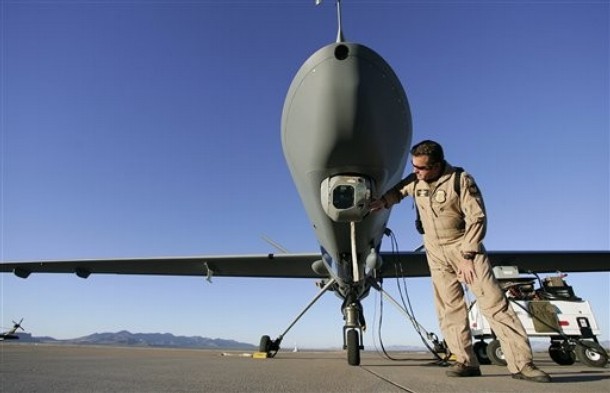Why Drones, Not Nation Building, Could Work in Afghanistan

Some commentators - Christian Brose, Joshua Foust, among others- pushing for a prolonged nation building campaign in Afghanistan argue that the alternative approach would fail to secure America's interests. That alternative approach was sketched out by George Will in his column yesterday:
"...do only what can be done from offshore, using intelligence, drones, cruise missiles, airstrikes and small potent Special Forces units..."
We're told this won't work because it didn't work in the 1990s and, in Joshua Foust's words, we need massive amounts of troops on the ground to get the right human intelligence. Brose goes onto suggest that the U.S. had been following Will's advice up till now with little success. To which one must ask - oh really? Is al Qaeda operating out of Afghanistan right now?
But the more specific point that a variant of Will's policy - targeted military action but no nation building - was found wanting in the 1990s, I think is also flawed for several reasons.
First, we did not have an armed Predator Drone in the 1990s. As the 9/11 Commission reported, there was a debate in the late Clinton/early Bush administrations whether to deploy one, but it became bogged down on the question of which agency would be responsible for pulling the trigger. Instead, we relied on cruise missiles fired from ships at sea. And we only did that on three occasions. Contrast that with the tempo of operations in Pakistan, where we've launched 53 attacks since the beginning of last year.
Today, with the drones operating in Pakistan, we're "decimating" al Qaeda's senior leadership. And how many U.S. soldiers are on the ground in Pakistan's tribal areas collecting human intelligence?
Second, the U.S. had very little grasp of Afghanistan in the 1990s. Whatever else comes from our post 9/11 experience there, we at least now have better information as to the forces and factions at work. We will have many more intelligence assets in the country than we had during the 1990s. That will almost certainly make an "off-shore" strategy more effective.
It's true that Will's favored approach won't cleanse Afghanistan of its Pashtun guerrillas or transform its society into a beacon of Central Asian stability. And I think it's true that a long term strategy of relentlessly bombing Pakistan and Afghanistan is counter-productive. But if that's the case, then the U.S. would be better served by focusing its energies on the ideological engines of international jihadism. And those are not in Afghanistan.



